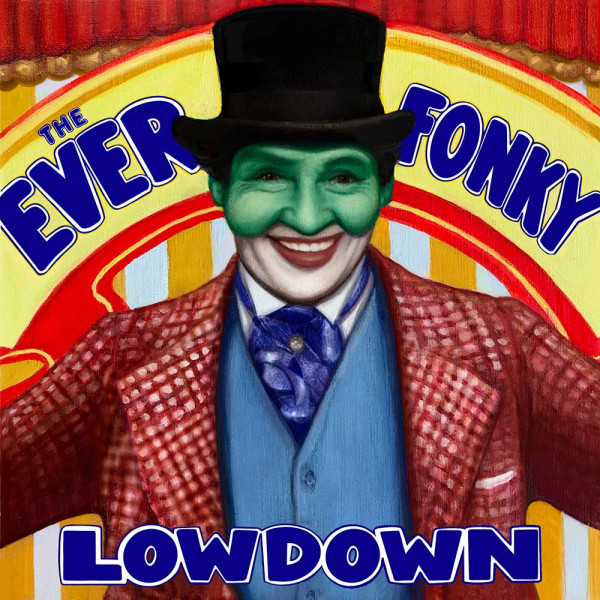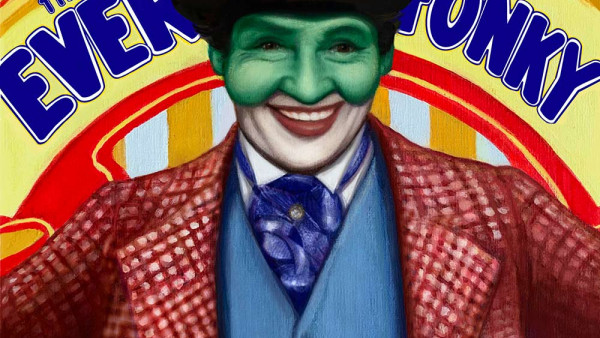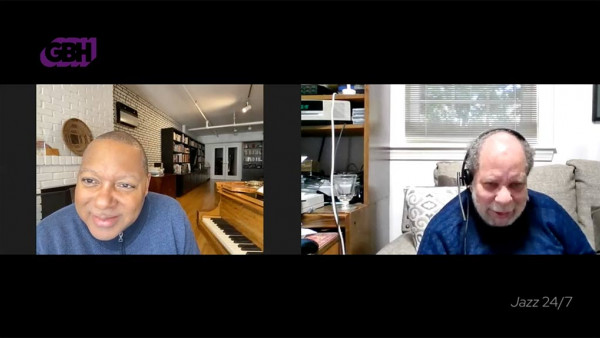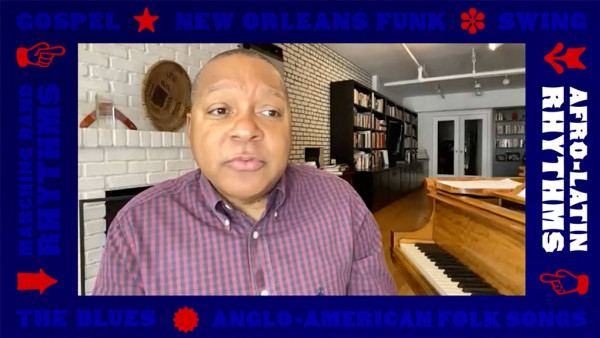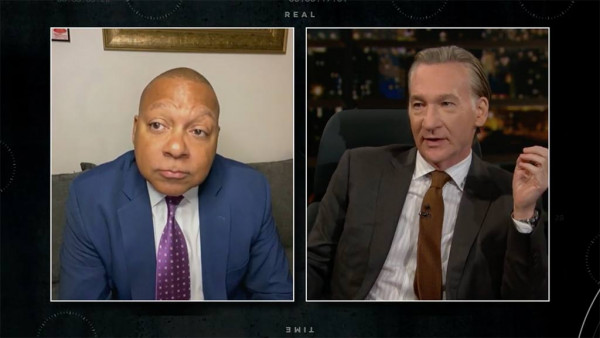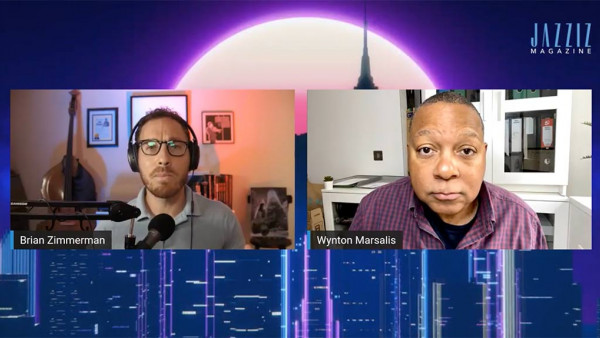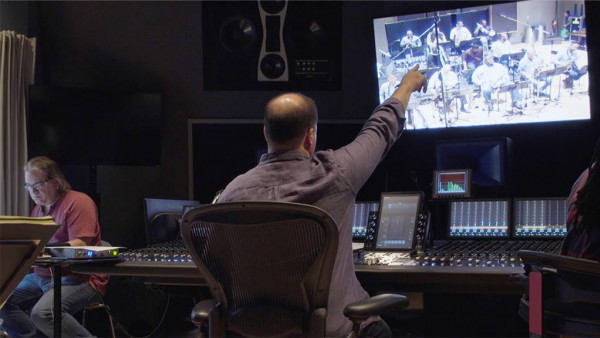Wynton Marsalis: ‘Continue to fight for the world you envision’
Wynton Marsalis once again takes a long hard look at America on his latest offering with the Jazz at Lincoln Center Orchestra — “The Ever Fonky Lowdown.”
The album, released on Blue Engine Records, uses satire, a Greek-style chorus, narration from celebrated actor Wendell Pierce (from “The Wire,” “Treme,” “Jack Ryan” and other works) and a mix of jazz, funk and other styles to address corruption, racism, greed and more.
“The Ever Fonky Lowdown” follows, while also building upon, the artist’s many other socio-cultural examinations, such as 1997’s Pulitzer Prize-winning “Blood on the Fields” and 2002’s acclaimed “All Rise.”
I recently had the chance to talk with the amazing trumpeter and bandleader, who is the managing and artistic director of Jazz at Lincoln Center.
Q: Where are you spending your time these days — sheltering in place, social distancing and whatnot?
A: Man, I’m all over. But I live in New York. So, I’ve been there more than anyplace. What about you?
Q: I’m in San Jose.
A: (Breaks into song) “Do you know the way to San Jose?”
Q: I do!
A: (Laughs)
Q: Since you’re in New York, I figure you’re a good person to address the bad rap we keep hearing about Big Apple – that it’s the end of New York City as we know it and it will never be the same again after coronavirus. Is that rap overblown or what?
A: It’s definitely overblown. Human beings come back. Let’s remember that the Jazz Age took place after the Spanish flu. Louis Armstrong was talking about how he survived the flu in 1918. He was in Chicago in 1923. He was in New York at 1925. There was no mention of Spanish flu in any of them after that.
(New York) will be back.
Q: Tell me about what’s going on at Jazz at Lincoln Center these days, given that the coronavirus has brought live performances to a halt for now.
A: We just put out (“The Ever Fonky Lowdown”). We are going to put out another album with Sesame Street, I think it’s at the end of October. We have a Chris Crenshaw piece called “Conglomerate” that’s going to come out.
We are going to do a Christmas show that’s going to have component parts to it. We are going to put on an Ella Fitzgerald show.
We’re going to continue to work.
It’s a very difficult time for us. But it’s encouraging, in this time, for me to see the way my colleagues have worked and how much work they’ve put into it and how much they believe in the mission of the organization.
It’s been a very enlightening and uplifting period, though very difficult.
Q: When did the idea behind “The Ever Fonky Lowdown” first come to you?
A: My little brother Ellis — we call him “the Oracle.” He lives in Baltimore, in the hood in Baltimore. We’ve been talking about this stuff for years, man. It’s just like I get up in the morning, me and him have an hour-long conversation. He always has stuff he’s reading and thinking about.
I think maybe in 2016, I started thinking to write a piece. Because we’re always talking about how things have gone on before. Like what I did just did with you about the Spanish flu. My brother studies all the time and he’s always saying, “Man, this is like Galileo.” He’s interested in a lot of stuff. He will say, “Copernicus did this and then Galileo did this. You’ve got to realize that the Babylonians ….” That’s his way of talking.
Q: Sounds like you two most have some interesting conversations.
A: So we were talking about Genghis Khan. I was saying, “You know Genghis Khan didn’t really have a hustle, because he was very straightforward about what he was doing to you and he would say, ‘If you see me, it’s a sign that God has failed you.‘” He wasn’t apologizing to you. He was an empire man.
We talk about the United States — “Are we a republic or are we an empire?” That goes back years with me and him talking. He might have been in high school when we first started talking about that.
Then I got the idea to lay out a game that would composite of the seven kinds of ways that people hustle everybody. I was studying American presidents and other figures who dominant people through some type of chicanery — like what Adolf Hitler did, what Julius Caesar did to convince the Romans to let him attack the Gauls.
Q: Introduce us to the fictional narrator of the story — “Mr. Game.”
A: He’s like a hustler. He hustles you. He’s a politician, a street hustler, a carnival barker, a con man. He has enticing rhetoric and that rhetoric gets you to sell out your integrity and buy into that seven-step progression of actions that lead to you beating some group of others that Mr. Game identifies with.
He’s slick. He’s very intelligent. He’s not a joke. He knows how to manipulate people. And he’s very tricky with words.
Q: Wendell Pierce does a great job playing the role of Mr. Game. How did the two of you end up working together?
A: Wendell is like another one of my brothers. He’s three years younger than me. We went to same two high schools in New Orleans. I met him when he was a freshman — I was a junior — at Benjamin Franklin Senior High School. Then we went to New Orleans Center for Creative Arts together.
Then I graduated and he came later to Julliard, which I had attended.
Down through the years, we were really extremely close. He actually narrated on my brother Branford’s album from 1984 called “Scenes in the City.”
Q: The libretto is full of so many memorable lines, often underscoring the message through irony and sarcasm. One that really caught mine attention was “Winners don’t reflect, we celebrate.” Winning and losing is a big theme on this album. Why is it so important for us to have this conversation?
A: That’s what the hustle is about. It’s like associative winning. Like when our team wins the Super Bowl and we buy their jerseys. We don’t get any money from them winning. But we have the associative glory.
So, our nation is somewhere and then, all of a sudden, we’re fighting some people we’ve never even thought about or heard of. But we hear these people are really bad and we have to stop them.
It plays out in families. It plays out in schoolyards. It plays out in little league. So, Mr. Game lays out his concept of winning — and, you know, you recognize it.
Q: Winners and losers — that’s just one of many distinctions that serve to separate. And the album is full of others — rich and poor, have and have-nots, etc. Mr. Game makes the point as he boasts “Our riches affirm that we are the greatest of the world” and warns “If you’re not us, you’re them.”
A: Take me and you on this phone call. You know a lot of stuff I don’t know. You have a whole world of experiences I have no knowledge of whatsoever.
So, if me and you can come together, man, we know much more — because there are two of us. It’s going to be much more than what I know alone.
But instead of that being my perspective, my perspective is there’s something I don’t like about you. It could be anything. But it will not be personal if I don’t know you. That’s us vs. them – once I get you in that binary space, you’re not listening because instead of using reason you are dealing with emotion. And once that emotion takes over, you will act against your best interests.
Q: As an artist, do you see this album connected to such past works as “Blood on the Fields” “From the Plantation to the Penitentiary.” Or does each project kind of live and breathe on its own?
A: Everything is connected. And it’s connected to the larger thing of all the other pieces that are like that — be it Duke Ellington’s pieces or whoever has written long pieces whose music I like. It goes back to when I first played the Haydn Trumpet Concerto or a longer piece that my father wrote called “Nostalgic Impressions” or a march like “High Society” or a ragtime piece.
Everything is connected. The question is … do you know that it is connected? Because there is nothing else for it to be.
Q: What do you hope that people get out of listening to “The Fonky Lowdown”?
I hope that it makes people develop the desire to be more acute about information.
When we built our building — the House of Swing in New York — I was in my early – to mid-30s. I’d go to meetings and everything everybody said made perfect sense to me — because I didn’t know (expletive) about building a building. I’d leave one meeting and I’d say, “Man, that sounds great.” I’d go to another meeting and a guy would say the opposite and I’d say, “That sounds great.”
Finally, I guy I was working with — his name was Jonathan Rose — I asked him, “Who is supposed to know about all this stuff?” He said, “You, man. You are supposed to know about it.”
Then I started to say, “OK, I got to develop the acuity to understand what we need to do.”
And I think we all need to understand just because somebody tells you something, and they are part of your tribe, doesn’t mean it’s accurate.
Look under the sheets and continue to fight for the world you envision and reach across lines of (expletive) to find people who are like-minded — and you are going to find them everywhere.
by Jim Harrington
Source: The Mercury News

